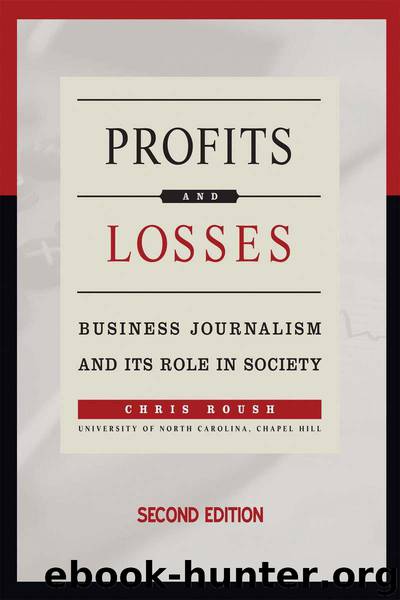Profits and Losses: Business Journalism and Its Role in Society by Chris Roush

Author:Chris Roush
Language: eng
Format: mobi
Publisher: Independent Publishers Group
Published: 2011-10-03T16:00:00+00:00
The company launched a massive public relations campaign to counter the story, charging that the show selectively used footage that supported its preconceived angle and not footage that portrayed Food Lion positively. The company also sued ABC, but not for libel. It claimed fraud and business deception, noting that the producers had obtained jobs under false pretenses. Food Lion’s stock price dropped 50 percent, and its sales fell after the segment aired. Although a judge initially awarded Food Lion $315,000 in damages, the award was later reduced to $2. However, the courts ruled that the reporters acted illegally.68
Two years after the GM debacle on Dateline and the Food Lion story on Prime Time Live, the ABC News program Day One ran an investigative story called “Smoke Screen” about how Philip Morris manipulated the nicotine in its cigarettes. The main reporter on the story was Walt Bogdanich, a former Wall Street Journal reporter who had won a Pulitzer Prize for investigating medical clinics. Two weeks later, Philip Morris sued ABC for libel, asking for $10 billion in damages.69 In 1995, the network settled the case by apologizing on the air to the cigarette company. But a year later, ABC aggressively reported on the industry again, with Peter Jennings on the nightly news airing a segment called “Never Say Die - How the Cigarette Companies Keep on Winning.”70
Although the Day One story was tarnished, few questioned the reporting. In fact, later stories and evidence proved the reporting correct. The end result, however, was a loss of credibility for this type of reporting, which included anonymous sources.
Overall, the television networks have done a good job of reporting about business, though their work has not been as measured as other types of media, notably newspapers and magazines. But what remains in the public’s perception of how TV approaches business journalism is the cases where it was later determined that their tactics and approaches to a story were unfair. And by using such strategies, all investigative business journalism on TV during the time came under question. The success of the companies in fighting back made it harder for many journalists in any form of media to report and write investigative pieces about business and industry without being accused of being unfair and receiving threats of lawsuits. Many of the network magazine shows remain today, and they still often produce segments critical of businesses and executives. And even today, these stories can have a tremendous impact on consumers and society. In North Carolina, there remain people who refuse to shop at Food Lion, more than a decade after the story ran.
Download
This site does not store any files on its server. We only index and link to content provided by other sites. Please contact the content providers to delete copyright contents if any and email us, we'll remove relevant links or contents immediately.
Autoboyography by Christina Lauren(4679)
Asking the Right Questions: A Guide to Critical Thinking by M. Neil Browne & Stuart M. Keeley(4576)
Dialogue by Robert McKee(3583)
Eat That Frog! by Brian Tracy(3514)
Sticky Fingers by Joe Hagan(3454)
Journeys Out of the Body by Robert Monroe(2985)
Elements of Style 2017 by Richard De A'Morelli(2945)
Annapurna by Maurice Herzog(2840)
Schaum's Quick Guide to Writing Great Short Stories by Margaret Lucke(2806)
Full Circle by Michael Palin(2772)
The Diviners by Libba Bray(2444)
The Art of Dramatic Writing: Its Basis in the Creative Interpretation of Human Motives by Egri Lajos(2414)
The Mental Game of Writing: How to Overcome Obstacles, Stay Creative and Productive, and Free Your Mind for Success by James Scott Bell(2394)
Why I Write by George Orwell(2360)
Atlas Obscura by Joshua Foer(2350)
In Patagonia by Bruce Chatwin(2271)
The Fight by Norman Mailer(2159)
The Elements of Style by William Strunk and E. B. White(2077)
Venice by Jan Morris(2051)
